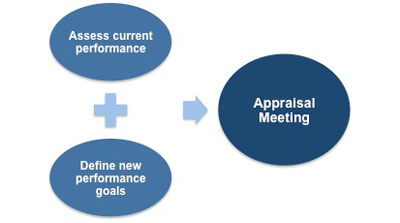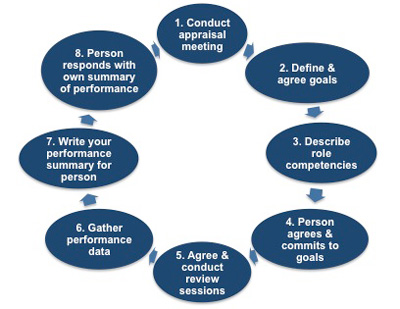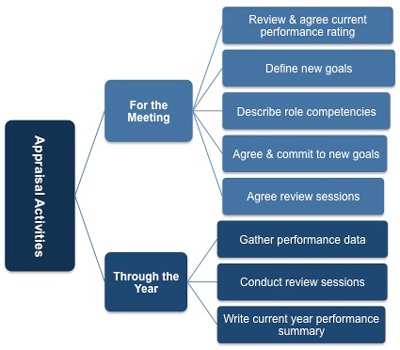Appraisal Meeting Tips
The appraisal meeting has a dual purpose: firstly, it provides a forum where you and your team member can discuss their performance over the most recent appraisal period; and secondly, it gives you an opportunity to discuss and agree with them a new set of goals for the next appraisal period.
 |
Appraisals will be of limited value if you merely talk to the individual and assign a rating to their performance. You must actively and openly talk about how they rate their own performance and discover their reasons for the rating. If this differs from your own rating, then you need to find out why and arrive at a final rating that is satisfactory to you both.
The importance of getting the team member to buy into this process and maximize their 'engagement' with the organization is covered in the eBook 'Principles of Performance Management,' which you can download free from this website.
Most appraisal processes are conducted over a twelve-month period as it matches the annual cycle of other key business functions, for example budgeting, pay reviews, and performance bonuses. You should allocate a high priority to your tasks associated with your appraisals as the success or failure of these meetings will directly impact performance.
Too often managers will delay appraisals because of a heavy workload or looming deadlines and these postponements leave people feeling undervalued, resulting in poor morale and a lack of motivation
You can easily avoid such a situation by showing that you view appraisals as an ongoing cycle that has regular reviews and feedback sessions throughout the year and is not just a one-off event.
 |
The stages of the appraisal process are:
1. Conduct the appraisal meeting.
2. Define and agree goals.
3. Describe role competencies.
4. Agree goals with the individual, and gain his or her commitment to them.
5. Agree and conduct regular review sessions.
6. Gather a wide range of performance data throughout the whole cycle.
7. Write your performance summary for the individual.
8. Individual responds to Stage 7 with their own performance summary.
For practical purposes we will use the actual appraisal meeting as the start of this cycle. This is because as a new manager one of your first actions should be to meet with each team member and understand what they see their role to be, what goals they are working towards, and how they view their contribution to the organization.
This Appraisal Meetings eBook will focus on the first five of these stages since the final three stages represent activities that need to be conducted outside of the actual meeting.
You need to allocate frequent slots within your monthly work schedule where you collate and record performance data. An effective way to collect the required data is to ask your team to structure their monthly progress reports in a way that maps to their personal goals.
You will also want them to record details of any significant incidents that have occurred. You should also create your own notes on such events, whether positive and negative.
 |
In addition you need to solicit information from both internal and external 'customers' of your team, in order to gather your own data about their performance and attitude.
Another key activity outside of the meeting itself is that of writing your summary and rating each person's performance and behavior against their roles and responsibilities. This must be done at least two weeks prior to the actual appraisal meeting to allow sufficient time for the individual to take on board what you have written and then comment on it when they write their own summary and hand it to you, which they should do at least a week before the appraisal meeting.
You may feel that you have little influence on how your organization wants performance appraisals conducted, but you can ensure that you incorporate all the eight stages of the process so that you have a real understanding of your team's performance. In this way you will be able to increase the effectiveness of your team members and improve their understanding of your organization's goals.
If you would like to learn more about the final three stages of the appraisal process that you need to conduct throughout the year or appraisal period then download our free eBook 'Principles of Performance Management.' You can use our Preparing for Appraisal Meeting Checklist, which outlines eight basic steps you need to complete so that you are properly prepared for your team's appraisal meetings.
Appraisal meetings create a formal record and provide documentary evidence of an individual's performance over a defined period. If you want to conduct successful appraisal meetings then it is imperative that you see them as part of an ongoing process and not an isolated annual event.
One way to achieve this is to effectively manage your time so that you can collate accurate and pertinent performance data for your team. You can choose to delegate some of these tasks in the form of regular reports. This collection of data needs to relate to the measurement criteria so that a true evaluation of performance can be made.
Another key activity is the organizing of regular review sessions with each member. These sessions create an atmosphere where open and honest dialogue can take place, during which one receives and gives constructive feedback. Such sessions culminate in a true assessment of the ongoing performance.
It is important that you ensure each individual has a clear understanding of the performance goals and competency development they signed up to and on how they are being measured, monitored, and evaluated. These sessions provide you with an ideal opportunity to keep each team member's performance on target and show your support and recognition of their efforts and commitment.
These sessions should prevent either you or the individual from having any shocks at the time of the formal appraisal and therefore ensure you attain the best performance from your team. Such activities are key to you being able to successfully conduct performance appraisals and to having a team that believes in you as a manager.
You may also be interested in:
Appraisal Forms Format | Appraisal Meeting Structure | Past Performance Evaluation | Appraisal Goals and Objectives | Appraisal Discussion Points.



